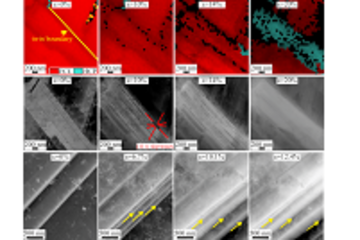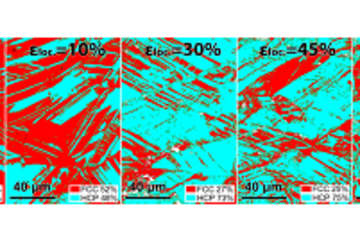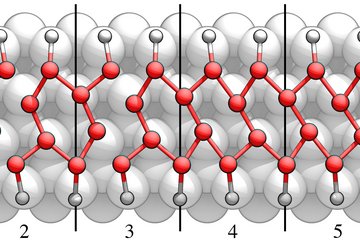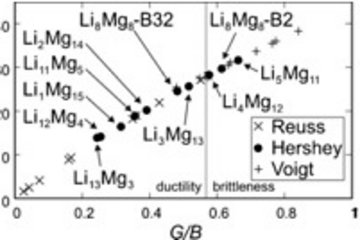All genres
2461.
Thesis - PhD
Strain rate sensitivity of automotive sheet steels: Influence of plastic strain, strain rate, temperature, microstructure, bake hardening and pre-strain. Dissertation, RWTH Aachen, Aachen, Germany (2010)
2462.
Thesis - PhD
Micromechanical Characterization of Ductile Damage in Sheet Metal. Dissertation, TU Delft, Delft, The Netherlands (2010)
2463.
Thesis - PhD
Evolution of microstructure during long-term creep of a tempered martensite ferritic steel. Dissertation, Ruhr-University Bochum, Bochum (2009)
2464.
Thesis - PhD
Modelling of Microstructure Evolution and Crack Opening in FCC Materials under Tension. Dissertation, Wollongong University, Wollongong New South Wales [Australia] (2009)
2465.
Thesis - PhD
Mechanical Characterization of Viscoelastic-Plastic Soft Matter using Nanoindentation. Dissertation, Ruhr-University Bochum, Bochum [Germany] (2009)
2466.
Thesis - PhD
High Resolution Investigation of Texture Formation Process in Diamond Films and the Related Macro-Stresses. Dissertation, Ruhr-University Bochum, Bochum [Germany] (2009)
2467.
Thesis - PhD
Zusammenhang zwischen Mikrostruktur, Schädigungsverlauf und mechanischen Eigenschaften bei TRIP Stählen. Dissertation, RWTH Aachen, Aachen, Germany (2008)
2468.
Thesis - PhD
Untersuchung metallphysikalischer und messtechnischer Grundlagen zur Rekristallisation und Erholung mikrolegierter IF Stähle. Dissertation, RWTH Aachen, Aachen, Germany (2008)
2469.
Thesis - PhD
Modeling and Experiment on Mo-based high temperature composites. Dissertation, Ecole Centrale Paris, Laboratoire for Materials, Paris [France] (2008)
2470.
Thesis - PhD
Kristallographische Texturen und richtungsabhängige mechanische Eigenschaften des Exoskeletts des amerikanischen Hummers sowie Texturen weiterer Biomaterialien. Dissertation, RWTH Aachen, Aachen, Germany (2008)
2471.
Thesis - PhD
Microstructure and mechanical properties of the exoskeleton of the lobster Homarus americanus as an example of a biological composite material. Dissertation, RWTH Aachen, Aachen, Germany (2008)
2472.
Thesis - PhD
Experimental and theoretical investigation of nanoindentation in a Cu single crystal. Dissertation, RWTH Aachen, Aachen, Germany (2008)
2473.
Thesis - PhD
Micromechanical Modeling and Simulations of Tranformation-Induced Plasticity in Multiphase Carbon Steels. Dissertation, TU Delft, Delft, The Netherlands (2008)
2474.
Thesis - PhD
Korrelation von mechanischen Eigenschaften und Kristallorientierung auf mikroskopischer und nanoskopischer Ebene. Dissertation, RWTH Aachen, Aachen, Germany (2008)
2475.
Thesis - PhD
Characterization of the Microstructure, Grain Boundaries and Texture of Nanostructured Electrodeposited CoNi by use of EBSD. Dissertation, RWTH Aachen, Aachen, Germany (2007)
2476.
Thesis - PhD
Crystallographic Texture of the Arthropod Cuticle Using Synchrotron Wide Angle X-ray Diffraction. Dissertation, RWTH Aachen, Aachen, Germany (2007)
2477.
Thesis - PhD
Charakterisierung und Entwicklung von bainitischen Multiphasen-Stählen. Dissertation, RWTH Aachen, Aachen, Germany (2007)
2478.
Thesis - PhD
Application of a dislocation density based flow stress model in the integrative through-process modeling of Aluminium production. Dissertation, RWTH Aachen, Aachen, Germany (2007)
2479.
Thesis - PhD
Der tribologisch asymmetrische Flachstauchversuch - Eine neue Methode zur Analyse von Reibungsvorgängen bei Umformprozessen. Dissertation, RWTH Aachen, Aachen, Germany (2001)
2480.
Thesis - Diploma
Untersuchung der Abhängigkeit des Ölaustrags von der Oberflächenfeinstruktur beim Auswalzen gedoppelter Aluminiumfolien. Diploma, HS Niederrhein, Krefeld, Germany (2003)











